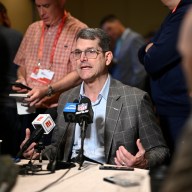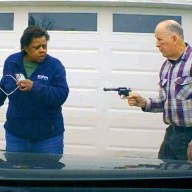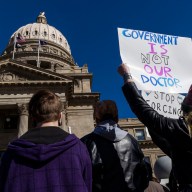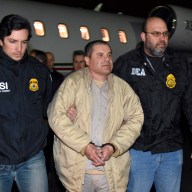By Richard Cowan
WASHINGTON (Reuters) – Ordinary Americans, generals and former Cabinet members paid respects at the U.S. Capitol Rotunda on Tuesday to the late U.S. President George H.W. Bush, who died last week at the age of 94 after a life of service as a World War Two hero, head of the CIA and wartime president.
Under the soaring Capitol dome, office workers and tourists walked in silence all day past a flag-draped casket that bore Bush’s body.
They were joined by former Secretary of State Colin Powell, who led the U.S. military during the 1991 Gulf War, as well as U.S. generals from that campaign against Iraq.
Crew members from the aircraft carrier USS George H.W. Bush were planning to pay their respects and the public was being admitted into the Rotunda throughout Tuesday night and until early Wednesday morning.
Bush, the 41st U.S. president, was remembered as a patrician figure who represents a bygone era of bipartisan civility in American politics.
National flags flew at half-staff on many foreign diplomatic buildings on Washington’s “Embassy Row,” past which Bush’s coffin will be transported on its way to the Washington National Cathedral for a memorial service on Wednesday.
People lined up outside the Rotunda in near freezing temperatures. Inside, Bob Dole, 95, was helped out of his wheelchair, stood up and saluted toward the casket. Dole was defeated by Bush in the fight for the 1988 Republican presidential nomination.
President Donald Trump, a fellow Republican, visited with the mourning Bush family at Blair House, an official guest house near the White House. They were greeted by former President George W. Bush, the late president’s son, and his wife Laura.
“The elegance & precision of the last two days have been remarkable!” Trump wrote of the Bush memorial events in an earlier tweet.
Bush’s service dog, a young Labrador retriever named “Sully,” also walked past the casket and sat near it briefly.
LONG SERVICE
Bush was a World War Two naval aviator who was shot down over the Pacific in 1944 and a former director of the Central Intelligence Agency. He was elected president in 1988 after serving two terms as President Ronald Reagan’s vice president.
During his four years in the White House, Bush ended the occupation of Kuwait by Iraqi President Saddam Hussein’s forces, steered the United States through the end of the Cold War and condemned China’s 1989 crackdown on pro-democracy demonstrators in Beijing’s Tiananmen Square.
“I’m very proud of the way that this country conducted their affairs under his presidency. And he’s (Bush) going to be sorely missed,” said Donald Woody, 52, a government contractor in the Washington area who visited the Rotunda. Woody, who was dressed in a Native American outfit on Tuesday, served in the U.S. Army from 1986 to 1992, encompassing Bush’s presidency
Bush was dogged by domestic problems, including a sluggish economy and the AIDS crisis. When he ran for re-election in 1992, he was pilloried by Democrats and many Republicans for violating his famous 1988 campaign promise: “Read my lips, no new taxes.”
Democrat Bill Clinton coasted to victory, ending Bush’s presidency.
A Connecticut Yankee from a wealthy family who moved to Texas to be an oilman, Bush has been eulogized as a president with a keen sense of civility and duty.
“No one’s ever been as qualified as he was,” said mourner Jim Wood, 55, who was waiting in line at the Capitol.
Bush is the 12th U.S. president to lie in state in the Capitol Rotunda. The first was Abraham Lincoln following his assassination in 1865.
Early in his political career, Bush served in the U.S. House of Representatives from 1967-71. He lost bids in 1964 and 1970 for a U.S. Senate seat from Texas.
The federal government and some financial exchanges will be closed on Wednesday for a day of mourning. Bush will be buried on Thursday in Texas.
(Reporting by Richard Cowan in Washington; Additional reporting by Susan Heavey and Susan Cornwell; Writing by Alistair Bell; Editing by Jonathan Oatis, Matthew Lewis and Lisa Shumaker)


















